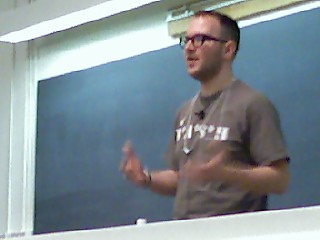Notes: Cory Doctorow at Harvard, Feb 15, 2006
Thursday, February 16th, 2006Cory Doctorow’s talk at Harvard tonight was titled “Set Top Cops” and worked through the various threats posed by DRM. I use the word “threat” not to take a side in this debate, though my position may be obvious, but rather to stress that this talk largely succeeded in discrediting DRM as sustainable strategy. Over an hour, Doctorow’s presentation constructed a checklist to determine the Internet-readiness of various business models. It roughly reads as follows:
Your business model is NOT Internet-ready IF…
- …it criminalizes the behavior of the majority of Internet users.
- …suppresses science.
- …allows product features to stagnate.
- …incurs multi-million dollar lawsuits.
- …content is valued over community.
- …it sustains the myth that there can ever be a copy-proof bit.
To support this list, Doctorow suggested that the majority of Internet users have participated in activity that infringed on a copyright monopoly. In the cases of anti-circumvention legislation (viz WIPO, DMCA) and permission-based extensibility (DVD tech), short-term protection has led to the loss of unforseen features and added value in long-term. He describes a century-long arc of change in the relationship between creators and consumers that begins with the key value lying in the charisma of performers, shifting toward virtuosity with recorded audio/ video, and arriving now with the conversational vibe of “MySpace bands.”
The success of the conversational creator/consumer relationship is a strange triumph for underground musics. My participation in hardcore/punk through out the 90’s and early-2000’s was largely reliant on friendship-style interaction. I regularly traded tapes and shows with strangers from around the world and the advent of the Internet facilitated an incredible amplification of these values. Entire tours could be booked via email and messageboards; ad-hoc social-networks prior to explicity relational tools such as Myspace, or Friendster. (Though, it should be noted that hardcore kids have always used available tech to step beyond traditional industry models. 15 years ago bands used the same blue box technology that launched Apple to book their tours.)
My thinking is also spurred by Doctorow’s discussion of the mythological “copy-resistant bit.” In true futurist fashion, I am beginning to suspect that now is simply an extension of a larger transitional phase in which we move away from media altogether. As input devices grow more intuitive and network availability edges toward ubiquity, there will be fewer and fewer barriers between our thoughts and their expressions. Where once the former enjoyed considerably more liberty, they may both soon achieve a sense of intangibility and infinite reproducibility. At that point, legal code concerning the copying of any expression ought to look quite different to be of any use to us.
I was pleased to hear the accomplished sci-fi author address his rather privileged position as both an advocate for the arts and a creator in one of the last fields (publishing) to remain relatively safe from the copying-frenzy that follows rampant digitization. “The biggest threat to an author is not piracy,” states Doctorow, “but obscurity.” By licensing his work to be distributed freely online and for dollars offline, he has broken free of this flight from obscurity but he recognizes that it is not a model that can last. “Technology giveth and technology taketh away,” he said, referring to the fact that writers should be considering ways to make money once their work is best distributed as bits.
For its simplicity, Doctorow’s working definition of DRM is worth reproducing here as well. “DRM controls your use of media after you acquire it lawfully.” I like this definition for its clarity in expressing that DRM hurts only those consumers who conform to the law.
He also wore a B * A * S * H shirt and that’s worth a few points alone!
